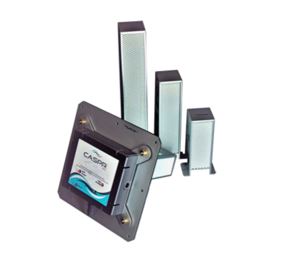Most food processing companies take the health and safety of their people and products very seriously. However, the COVID-19 pandemic has exposed weaknesses in their sanitation and hygiene regimes used to prevent person-to-person and person-to-product transmissions. The periodic cleaning processes used to mitigate these transmission pathways for listeria and salmonella are ineffective when an airborne pathogen can immediately re-contaminate a recently cleaned surface. The solution offered by CASPR is a continuous way to clean the air and surfaces to further reduce pathogen transmission risks for safer food processing facilities.
How CASPR Works
CASPR, which stands for Continuous Air and Surface Pathogen Reduction, uses UV light and a catalyst to generate negatively charged hydrogen peroxide molecules. When a CASPR unit is placed in the ventilation ductwork, it produces hydrogen peroxide that will circulate through the air and land on all surfaces. While in the air and on surfaces, these negatively-charged molecules are actively seeking out positively-charged molecules, like mold, bacteria, and viruses, to neutralize them at the molecular level. CASPR has been proven to be 99.96% effective against these pathogens, including the SARS-CoV-2 virus which causes COVID-19.
Enhancement to Cleaning Processes
CASPR can be a great enhancement to regular surface cleaning processes because it fights contamination of surfaces that may happen from either airborne or touch transmission in between cleanings. In a facility where a CASPR unit has been continuously operating, the .01 parts per million of hydrogen peroxide circulating in the air will attack and inactivate airborne pathogens immediately. This is an advantage over UV lights and HEPA filtration because it may take several minutes for the air to circulate the airborne pathogen to these devices allowing it time to land on surfaces.
After the hydrogen peroxide circulates in the air, it will land on all surfaces that are exposed to air. With a 20 minute half-life, the hydrogen peroxide molecules will reside on surfaces forming a protective coating. When a pathogen lands on a surface and comes in contact with a hydrogen peroxide molecule, it will be deactivated. Without the CASPR system providing continuous protection, a pathogen that lands on a surface has a high probability of being retransmitted to people or product.
Where to Use CASPR
CASPR is safe to use in all parts of a food processing facility. Hydrogen peroxide is an FDA approved food additive so there are no food safety risks when it to comes in contact with food products. When hydrogen peroxide is air borne, the concentration of .01 parts per million is 100 times below the allowable exposure level for people.
 A good example of where to use CASPR is in the evisceration and cutting areas of meat and poultry packing plants. In these areas, workers are standing shoulder-to-shoulder in a room that has low temperatures and high humidity which is perfect for virus transmission. That is why meat and poultry packing plants had significant breakouts of COVID-19.
A good example of where to use CASPR is in the evisceration and cutting areas of meat and poultry packing plants. In these areas, workers are standing shoulder-to-shoulder in a room that has low temperatures and high humidity which is perfect for virus transmission. That is why meat and poultry packing plants had significant breakouts of COVID-19.
Another good example of where to use CASPR is in the locker room area. Because pathogens have been found to ride in on clothing and shoes, it is one of the highest risk areas of pathogen transmission. A CASPR unit operating in the locker room area will continuously clean all surfaces including the floors!
Proven Technology
CASPR’s technology was first applied to healthcare facilities. Hospitals that used CASPR units showed a significant reduction in the healthcare associated infection rate and a lowered incidence of MRSA infections. Because of CASPR’s ability to disinfect every surface exposed to air, some hospitals stopped using UV lights in their cleaning processes.
Conclusion
CASPR provides a great way for food processing facilities to take their sanitation and hygiene regimes to the next level and to distinguish themselves from their competition. If you are interested in learning more about how CASPR can create safer food processing facilities for you, contact a ventilation expert at Eldridge and we will come out to your facility and provide a free consultation.
